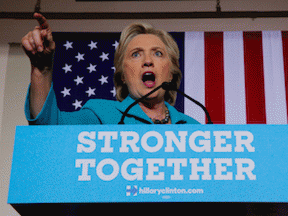Hillary Clinton's Blitzkrieg Campaign:
the Savage Politics of the Oligarchs
It doesn't matter what the friggin' legal and ethics people say.
We need to win this motherf*cker.
--Mr. Scott Foval, Field Director, Americans United for Change, retained
by the Clinton campaign and the Democratic National Committee
An elite stratum of wealthy and politically dominant people intends to make Hillary Clinton our next president. These are the oligarchs, the "1%" whose wealth and incomes continue growing while most American struggle.
In her private life Hillary Clinton is well-positioned among this cohort, and they expect her as President to protect their wealth and maintain their dominance. She will.
will win the general.
Who are these people? The top 1% of wealth-holders numbers about 3.25 million. Predominantly they are citizens whose wealth depends on the huge American domestic and transnational corporations, either directly--executives, directors, investors, contractors, suppliers--or indirectly in other ways (e.g. investment bankers, hedge fund managers, consultants, top law firms). Two preeminent names in this grouping are Hillary and Bill Clinton, whose net worth (about $125 million) qualifies the couple for the 1% stratum by a factor of 16. Others are Wall Street bankers--the Clintons' primal financial benefactors and first-name friends: Lloyd Blankfein, Jamie Dimon, Robert Rubin, Brian Moynihan, Michael Corbat, James Gorman, Timothy Geithner, John Stumpf, etc. A more accurate description of the "1%" would be the corporate elite.
Candidate Clinton's relationship to her elite compatriots is one of rigid interdependence: she needs their financial and political resources to win the election, and they need her in the White House to sustain their privileged status.
This privileged status did not result from accident, random chance, or neglect. It is a consequence of public policies consciously adopted over the past three or four decades which shift wealth and incomes systematically upward. (Cutting taxes for corporations and the wealthy, for example, while exporting 1/3 of the nation's manufacturing jobs.) In the process our democracy was transformed. Public policy is crafted today not primarily to advance the welfare of the nation's people, but to create, protect or enhance the financial interests of American corporate enterprise. This is acknowledged in the statements of public figures and supported in rigorous scholarly research.
Though easily identifiable, the corporate elite has not constructed a conscious conspiracy against the
American people at large with a preplanned agenda, strategy, and tactics. But they share a common mindset, they are networked by personal acquaintance, and they are driven by a common imperative. Their wealth and political dominance depend on the existing configurations of American domestic and foreign policy, both of which must be maintained essentially intact to sustain the group's position of privilege. Alterations in the status quo can be tolerated only if they are cosmetic, slight, and at the margin.
Instead of conspiracy, the preeminence of the oligarchs is better seen as a malignant condition of contemporary American government, resulting from years of institutional decay and corruption. (The story of moribund democracy is detailed here.) The economic and political power of mega-corporations--increasingly fewer but ever larger--has displaced functional democracy.
(Yes, we vote as we always have, but voting and democracy are not interchangeable terms. The Russian people voted for Vladimir Putin, the Iraqis voted for Saddam Hussein. And voting isn't a prerequisite for democracy to function: the ancient Greeks chose their representatives by lottery.)
The priority of corporate interests has been achieved by three powerful mechanisms.
Perhaps the least recognized is the degree to which corporate personnel enter government to staff the highest levels of the Executive Branch. A new book by political scientists Bastiaan van Apeldoorn and Nana de Graaff carries a sobering title: A merican Grand Strategies and Corporate Elite Networks. They looked into the "grand strategy makers," the 30 most influential people in cabinet-level and senior advisory positions in the last three administrations--Bill Clinton's, Bush's, and Obama's. In the Clinton Administration, 25 of the 30 "grand strategy makers" (83%) were linked to 197 different transnational or financial corporations, as executives, directors, senior associates, or partners in law firms, either prior to their public service or after it. In the Bush Administration 27 of the 30 (90%) had connections to 157 corporations. In the Obama Administration 23 of the 30 (over 70%) had such "top-level corporate affiliations" with 111 companies.
Smoking guns? Examples of wealth-shifting upward to the already rich? Certainly. (1) The repeal of the
Glass-Steagall Act, rammed through in the Bill Clinton Administration by Treasury Secretary Robert Rubin from Citigroup. This enabled the subprime loan frenzy, enriching the New York banks but destroying $13 trillion in Americans' household wealth. (2) Halliburton's no-bid, obscenely profitable contracts in Iraq, served up by Vice President Richard Cheney during the Bush Administration; billions of taxpayers' dollars to the corporation Mr. Cheney once chaired. (3) In the Obama Administration Treasury Secretary Timothy Geithner from Wall Street administered the Troubled Asset Relief Program, bailing out his colleagues' banks, again with billions of
taxpayers' money.
For the last 24 years the Executive Branch has been dominated by the corporate elite.
Two other mechanisms of corporate influence are far more familiar: the corporate financing of political campaigns and the ubiquitous enterprise of lobbying. The two practices are related in direct proportion: the more you accept in contributions from Boeing, say, the more you feel obligated to yield to their lobbyist's wishes.
(Note: You can view every article as one long page if you sign up as an Advocate Member, or higher).






